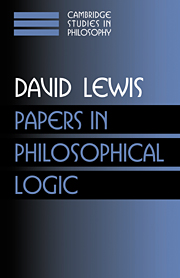Book contents
- Frontmatter
- Contents
- Dedication
- Introduction
- 1 Adverbs of quantification
- 2 Index, context, and content
- 3 ‘Whether’ report
- 4 Probabilities of conditionals and conditional probabilities II
- 5 Intensional logics without iterative axioms
- 6 Ordering semantics and premise semantics for counterfactuals
- 7 Logic for equivocators
- 8 Relevant implication
- 9 Statements partly about observation
- 10 Ayer's first empiricist criterion of meaning: why does it fail?
- 11 Analog and digital
- 12 Lucas against mechanism
- 13 Lucas against mechanism II
- 14 Policing the Aufbau
- 15 Finitude and infinitude in the atomic calculus of individuals (with Wilfrid Hodges)
- 16 Nominalistic set theory
- 17 Mathematics is megethology
- Index
2 - Index, context, and content
Published online by Cambridge University Press: 05 June 2012
- Frontmatter
- Contents
- Dedication
- Introduction
- 1 Adverbs of quantification
- 2 Index, context, and content
- 3 ‘Whether’ report
- 4 Probabilities of conditionals and conditional probabilities II
- 5 Intensional logics without iterative axioms
- 6 Ordering semantics and premise semantics for counterfactuals
- 7 Logic for equivocators
- 8 Relevant implication
- 9 Statements partly about observation
- 10 Ayer's first empiricist criterion of meaning: why does it fail?
- 11 Analog and digital
- 12 Lucas against mechanism
- 13 Lucas against mechanism II
- 14 Policing the Aufbau
- 15 Finitude and infinitude in the atomic calculus of individuals (with Wilfrid Hodges)
- 16 Nominalistic set theory
- 17 Mathematics is megethology
- Index
Summary
SYNOPSIS
If a grammar is to do its jobs as part of a systematic restatement of our common knowledge about our practices of linguistic communication, it must assign semantic values that determine which sentences are true in which contexts. If the semantic values of sentences also serve to help determine the semantic values of larger sentences having the given sentence as a constituent, then also the semantic values must determine how the truth of a sentence varies when certain features of context are shifted, one feature at a time.
Two sorts of dependence of truth on features of context are involved: context-dependence and index-dependence. A context is a location – time, place, and possible world – where a sentence is said. It has countless features, determined by the character of the location. An index is an n-tuple of features of context, but not necessarily features that go together in any possible context. Thus an index might consist of a speaker, a time before his birth, a world where he never lived at all, and so on. Since we are unlikely to think of all the features of context on which truth sometimes depends, and hence unlikely to construct adequately rich indices, we cannot get by without context-dependence as well as index-dependence. Since indices but not contexts can be shifted one feature at a time, we cannot get by without index-dependence as well as context-dependence.
- Type
- Chapter
- Information
- Papers in Philosophical Logic , pp. 21 - 44Publisher: Cambridge University PressPrint publication year: 1997
- 6
- Cited by

